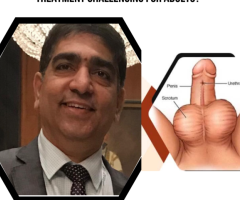While hypospadias correction surgeries are typically performed between the ages of 6 to 18 months for optimal success, it's important to note that adults of varying ages, including those in their late 20s, 40s, and beyond, may still opt for repair treatment.
However, there are certain challenges associated with hypospadias repair treatment in adults:
Tissue Hardness and Complications: The hardness of tissues in adults can make the surgery more complicated and extend the recovery time.
Psychological Readiness: Mental preparedness is crucial for undergoing surgery, but adults may face psychological challenges and struggle with low self-confidence levels, which can be significant hurdles to overcome.
Incre...
While hypospadias correction surgeries are typically performed between the ages of 6 to 18 months for optimal success, it's important to note that adults of varying ages, including those in their late 20s, 40s, and beyond, may still opt for repair treatment.
However, there are certain challenges associated with hypospadias repair treatment in adults:
Tissue Hardness and Complications: The hardness of tissues in adults can make the surgery more complicated and extend the recovery time.
Psychological Readiness: Mental preparedness is crucial for undergoing surgery, but adults may face psychological challenges and struggle with low self-confidence levels, which can be significant hurdles to overcome.
Increased Risk of Bleeding: Adults may have larger penile sizes and experience erections, which can increase the risk of bleeding during surgery and impact wound healing.
Limited Surgeon Expertise: Since most surgeons primarily deal with paediatric hypospadias cases, their expertise in handling adult cases may be limited, posing potential challenges during treatment.
Multiple Surgeries and Long Recovery: Depending on the severity of the condition, multiple rounds of surgeries may be required. However, the long recovery time associated with adult surgeries can prolong the treatment process.
Despite these challenges, adults considering hypospadias repair treatment should consult with experienced urologists to discuss their options and weigh the potential risks and benefits. With proper care and guidance, successful outcomes can still be achieved in adult cases of hypospadias.



